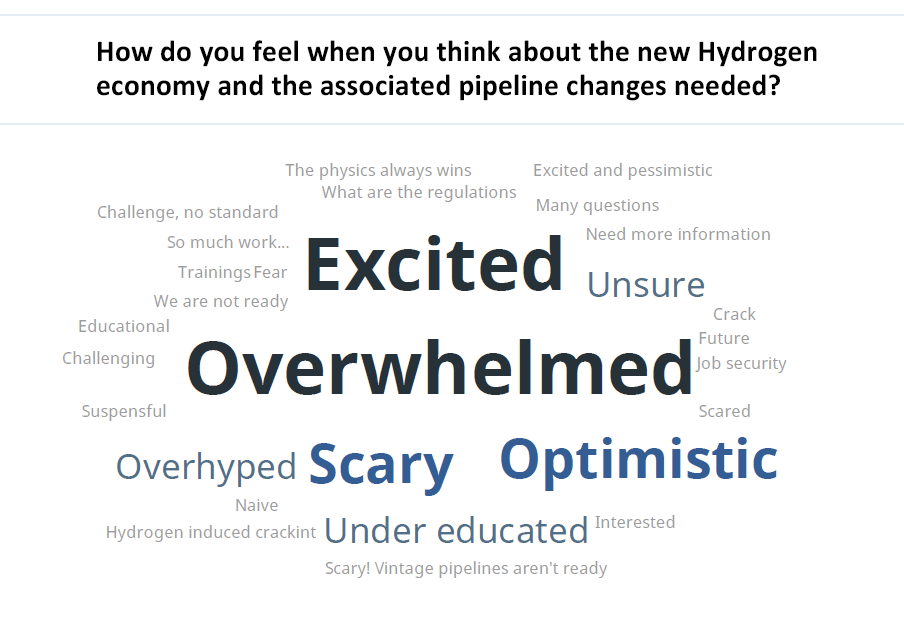Insights and Highlights from PC2023: Navigating the Path Toward Operational Excellence
As the dust settles from this year’s Partners’ Conference (PC2023) in Calgary, Alberta, we find ourselves reflecting on a day filled with innovation, collaboration, and a deep dive into the heart of pipeline integrity management. This annual event has become a cornerstone for our teams and valued clients, providing a platform to connect, share insights, and explore the ever-evolving landscape of the industry.
This year was particularly special as we had the chance to host PC2023 in person in Calgary, rekindling face-to-face interactions and strengthening our bonds with clients. The presence of our partner Business Units, NDT-Global, and Eddyfi Technologies, added another layer of collaboration and expertise to the mix. The event unfolded with a packed agenda, fostering insightful discussions, and paving the way for meaningful connections. A few key takeaways and learnings stood out from insightful discussions with our valued client attendees highlighted below.
Operational Excellence Starts with Data
The theme for PC2023, “Operational Excellence Starts with Data,” set the tone for the day. We kicked off with our Corporate Update, taking our audience on a journey by highlighting our key milestones achieved in 2023 and our vision into 2024 as part of the Previan family, weaving in the foundational role data plays in ensuring the reliability, safety, and operational performance of pipeline infrastructure.
Our Technology update provided a glimpse into our Product Roadmap, emphasizing the crucial role of quality and valid data as a catalyst for meeting industry and regulatory requirements. We delved into the application of SME-guided Machine Learning models, showcasing the power of data management and integrity analysis in the journey toward digital transformation. The session left our audience with a newfound appreciation for the transformative potential that lies within their data and for the pitfalls of using inadequate data to support their business needs.
The Value of Industry Collaboration
In the pipeline industry, operator collaboration is a vital force driving progress. PC2023 served as a platform where our team showcased collaborative initiatives with clients, such as the PHMSA Gas Mega Rule (GMR) Consortium and Quantitative Risk Assessment (QRA) Consortium.
Our Industry Consortiums, led by partners, cover diverse activities, from sharing best practices to innovating pipeline integrity management approaches. The overarching goal is to enhance safety, operational efficiency, environmental protection, and economic benefits. Identifying and mitigating common threats standardizes risk management practices, ensuring high safety standards industry-wide. Sharing root causes promotes collaborative learning and continuous improvement.
Collaboration is crucial for addressing regulatory compliance and environmental stewardship. It enables operators to understand and adhere to regulations, share best practices, and collectively advocate for fair regulatory frameworks. Initiatives extend to knowledge sharing, workforce development, and stakeholder engagement.
Operator collaboration is not just beneficial but essential for the sustained advancement of the pipeline sector. It drives safety, innovation, environmental responsibility, cost efficiency, compliance, and stakeholder engagement, positioning collaborative efforts as key to the industry’s future success amidst evolving challenges and scrutiny.
Exploring Emerging Fuels
PC2023 didn’t shy away from discussing emerging trends. A dedicated session on Emerging Fuels explored the potential impact on the Pipeline Integrity industry through interactive polls and audience Q&A, revealing intriguing results.
Throughout the discussion, it was evident that the transition toward a hydrogen pipeline economy has experienced moderate urgency over the past few years. This deceleration can be attributed to several factors. Firstly, despite the recognized potential of hydrogen as a clean energy carrier, challenges related to large-scale production, distribution infrastructure, and cost-effective technologies have tempered the immediate impetus for widespread adoption. This has led to the industry taking a more guarded perspective on hydrogen projects. A few companies have been steadily moving forward, while others have dialed back plans significantly.
Based on poll results, the industry is grappling with pivotal questions, including the identification of takeoff demand, the potential impact of available production technology on global 2030 and 2050 targets, and the influence of proposed hydrogen hubs in the U.S. on transportation infrastructure.
Furthermore, there is uncertainty about whether co-funding and subsidies will extend to the crucial areas of transmission and distribution. Despite these uncertainties, there is a prevailing belief that integrity issues associated with hydrogen can be effectively managed, with the conversion of existing infrastructure emerging as a likely outcome, although further research is deemed necessary.
Insights from the Dynamic Risk polls conducted at the Partners’ Conference shed light on the industry sentiment:
- The top responses to feelings about the Hydrogen economy were “Excited” and “Overwhelmed”
- Regarding the types of hydrogen projects, one-third of the respondents mentioned that their projects were in the early or planning stages, and notably, there were no respondents working on new transmission pipeline projects.
- Government co-funding was deemed essential for advancing projects, with 88% of respondents expressing this view.
- A significant portion (63%) of respondents reported that they did not have a dedicated hydrogen team, and 80% relied on self-education to train their workforce.
- Expectations for blending targets were modest, with nearly 84% of respondents identifying targets of 10% or less.
These results collectively reflect a cautious yet evolving landscape in the hydrogen industry, where challenges and uncertainties are met with a mix of optimism and practical considerations.

Pipeline Risk Management through the Eyes of a CFO
The day concluded with a unique perspective on Pipeline Integrity Management—from the eyes of a CFO. The session emphasized the importance of leveraging a risk-based approach for operational budget planning and spending. It explored an approach to bridge the challenging language barrier between finance and risk and consequence-based reporting that currently inhibits integrity investment planning.
The discussion reviewed the application of financial capital investment methodology and net present value analysis in conjunction with probability and consequence of failure analysis, facilitating the creation of investment metrics and related prioritization. Attendee discussion included a focus on the impacts of escalating consequence costs resulting from successive failures and the incorporation thereof in the financial modeling.
In wrapping up PC2023, we find ourselves not just reflecting on the insights gained but looking ahead to the collective journey toward operational excellence—a journey fueled by data, collaboration, and a commitment to addressing the challenges of the ever-evolving pipeline industry.
On behalf of our team, looking forward to seeing you at PC2024!

About the Author:
Tracey Murray, Vice President Sales & Marketing
Tracey brings over 15 years of experience in her role as Vice President, Sales and Marketing. She has spent her career predominantly within the energy industry working for global technology companies, focused on strategic growth and market expansion through a streamlined sales and marketing approach.
At Dynamic Risk, Tracey oversees the sales, commercial operations, and marketing domain, with a specific focus on developing value-add activities and initiatives with our valued clients and partners.
Tracey holds her Bachelor of Management in Business, with a minor in International Marketing.


